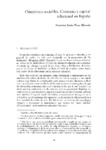Omnívoros sociales. Consumo y capital relacional en España

View/
Use this link to cite
http://hdl.handle.net/2183/2713Collections
Metadata
Show full item recordTitle
Omnívoros sociales. Consumo y capital relacional en EspañaAuthor(s)
Date
1998Citation
Sociológica. Revista de pensamiento social, 1998, 3: 69-92 ISSN: 1137-1234
Abstract
[Abstract] Increasing attention is being paid to the interaction of social networks and
social class in the analysis of consumption and leisure styles. In connection with the
olurlÍvorous hypothesis, according to which middle classes show a specific pattern
of luixed tastes and practices, cultural variation is supposed to be related to social
diversity.
In the paper this set of arguments is tested with Spanish data. Data come frOlU
the CIRES and ECBC surveys, and are analyzed by using factor analysis and 111ulti..
pIe üLS regression techniques [Resumen] A partir del análisis de Bourdieu sobre el espacio social del conSU1UO y de las crí..
ticas surgidas en torno a él, en el trabajo se analiza el ilupacto que tiene el capital
relacional sobre las prácticas culturales. En particular se contrasta la hipótesis de
que esta variable tuodula la relación entre la clase social y el consumo, de forma que
el patrón híbrido de consumo cultural que caracteriza a las nuevas clases 111edias
obedece al menos en parte a la variedad de su capital relacional.
Los datos para la contrastación empírica proceden de la Encuesta de Estructura,
Conciencia y Biografía de Clase, y de la Encuesta de Vida Cotidiana del Centro de
Investigaciones para la Realidad Social. Para el análisis se recurre fundaluen..
talmente al análisis factorial y a la regresión múltiple.
ISSN
1137-1234





